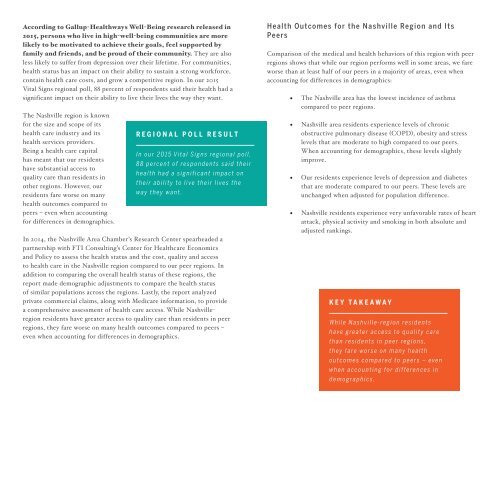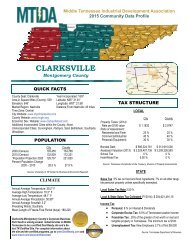vital_signs_2015_web
You also want an ePaper? Increase the reach of your titles
YUMPU automatically turns print PDFs into web optimized ePapers that Google loves.
According to Gallup-Healthways Well-Being research released in<br />
<strong>2015</strong>, persons who live in high-well-being communities are more<br />
likely to be motivated to achieve their goals, feel supported by<br />
family and friends, and be proud of their community. They are also<br />
less likely to suffer from depression over their lifetime. For communities,<br />
health status has an impact on their ability to sustain a strong workforce,<br />
contain health care costs, and grow a competitive region. In our <strong>2015</strong><br />
Vital Signs regional poll, 88 percent of respondents said their health had a<br />
significant impact on their ability to live their lives the way they want.<br />
The Nashville region is known<br />
for the size and scope of its<br />
health care industry and its<br />
health services providers.<br />
Being a health care capital<br />
has meant that our residents<br />
have substantial access to<br />
quality care than residents in<br />
other regions. However, our<br />
residents fare worse on many<br />
health outcomes compared to<br />
peers – even when accounting<br />
for differences in demographics.<br />
REGIONAL POLL RESULT<br />
In our <strong>2015</strong> Vital Signs regional poll,<br />
88 percent of respondents said their<br />
health had a significant impact on<br />
their ability to live their lives the<br />
way they want.<br />
In 2014, the Nashville Area Chamber’s Research Center spearheaded a<br />
partnership with FTI Consulting’s Center for Healthcare Economics<br />
and Policy to assess the health status and the cost, quality and access<br />
to health care in the Nashville region compared to our peer regions. In<br />
addition to comparing the overall health status of these regions, the<br />
report made demographic adjustments to compare the health status<br />
of similar populations across the regions. Lastly, the report analyzed<br />
private commercial claims, along with Medicare information, to provide<br />
a comprehensive assessment of health care access. While Nashvilleregion<br />
residents have greater access to quality care than residents in peer<br />
regions, they fare worse on many health outcomes compared to peers –<br />
even when accounting for differences in demographics.<br />
Health Outcomes for the Nashville Region and Its<br />
Peers<br />
Comparison of the medical and health behaviors of this region with peer<br />
regions shows that while our region performs well in some areas, we fare<br />
worse than at least half of our peers in a majority of areas, even when<br />
accounting for differences in demographics:<br />
• The Nashville area has the lowest incidence of asthma<br />
compared to peer regions.<br />
• Nashville area residents experience levels of chronic<br />
obstructive pulmonary disease (COPD), obesity and stress<br />
levels that are moderate to high compared to our peers.<br />
When accounting for demographics, these levels slightly<br />
improve.<br />
• Our residents experience levels of depression and diabetes<br />
that are moderate compared to our peers. These levels are<br />
unchanged when adjusted for population difference.<br />
• Nashville residents experience very unfavorable rates of heart<br />
attack, physical activity and smoking in both absolute and<br />
adjusted rankings.<br />
KEY TAKEAWAY<br />
While Nashville-region residents<br />
have greater access to quality care<br />
than residents in peer regions,<br />
they fare worse on many health<br />
outcomes compared to peers – even<br />
when accounting for differences in<br />
demographics.












